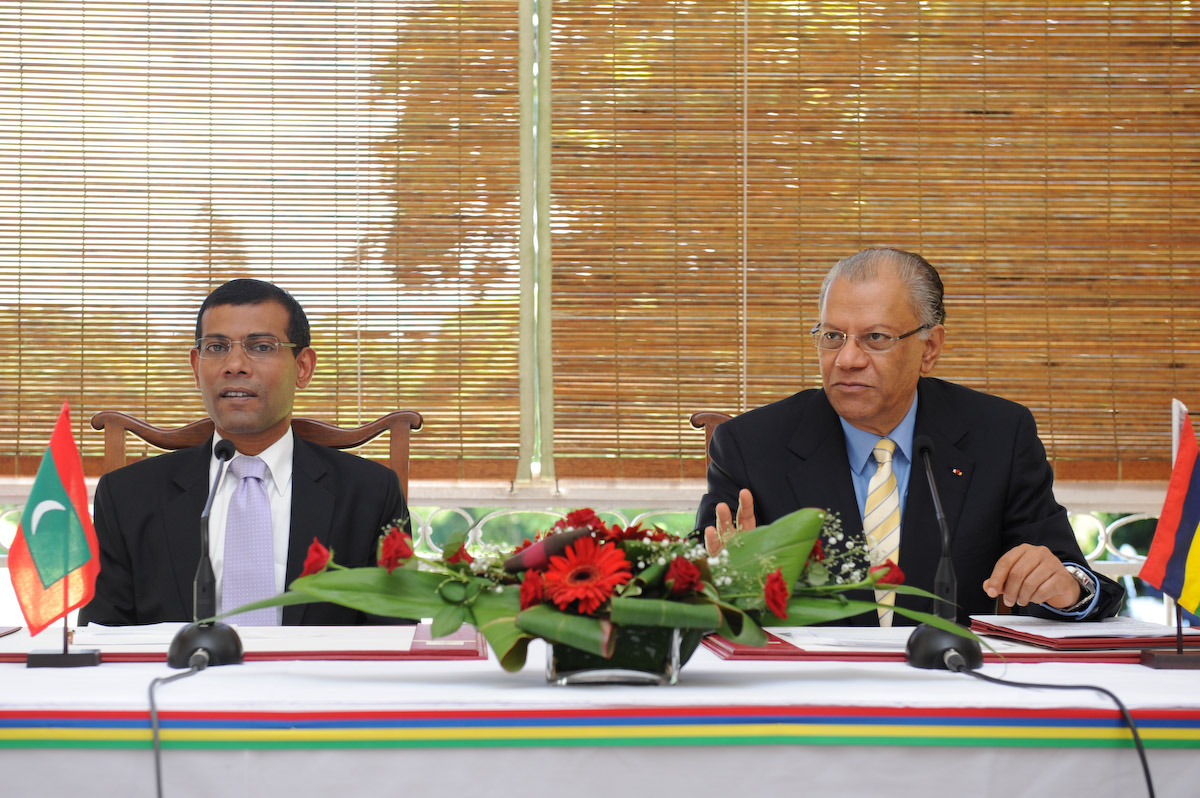Malé, Maldives – Speaker of Parliament and Former President, Mohamed Nasheed has told that Chagos Islands were never a part of the Mauritius.
Speaking at the parliament yesterday, Speaker Nasheed told that he does not believe that Chagos Islands were ever a part of Maurituis and that they went to the International Tribunal for the Law of the Sea (ITLOS) over the dispute concerning delimitation of the maritime boundary between Mauritius and Maldives after failure to act on the joint communiqué of 2011.
His remarks come following public disparagement after Attorney General Ibrahim Riffath revealed at the Special Chamber of International Tribunal for the Law of the Sea (ITLOS) during the oral proceedings in the dispute concerning delimitation of the maritime boundary between Mauritius and Maldives in the Indian Ocean, that President Ibrahim Mohamed Solih had sent a letter to the Mauritian Prime Minister informing that Maldives will vote in favor of Mauritius to recognize Chagos as part of Mauritius.
It was revealed that on 22 August 2022, the President of the Maldives sent a letter to the Prime Minister of Mauritius stating that the Maldives would vote in favor of the United Nations General Assembly Resolution entitled “Advisory opinion of the International Court of Justice on the legal consequences of the separation of the Chagos Archipelago from Mauritius in 1965”.
AGO has since stated that the government was not considering to agree on the Mauritius claim of the outer continental shelf entitlement to the north of the Chagos Archipelago, overlapping by some 22,000 square kilometres with the entitlement of the Maldives.
Background of the issue:
In July 2010, Maldives submitted its claims to the United Nations for an extended continental shelf and new coordinates that claimed the full 200 nautical mile EEZ measured from Addu Atoll, the southern-most atoll in the country. This ignored the 1992 understanding with the United Kingdom and was also inconsistent with Maldives’ previous willingness to negotiate overlapping EEZs with Sri Lanka and India, its northern neighbours.
Maldives argued that Chagos was a unique case because it does not possess a population dependent on fishing, or indeed any permanent population at all – an argument apparently not supported by the UN Convention on the Law of the Sea (UNCLOS), which allows EEZs to be claimed for any habitable island whether or not it is inhabited.
Mauritius then entered the fray, protesting against both the United Kingdom and Maldives. Maldives did not officially take any position over Chagos sovereignty and had previously declined to negotiate with Mauritius over maritime boundaries. However, in 2011, President of Maldives Mohamed Nasheed, during a visit to Mauritius, issued a joint communiqué stating that the two countries would make a “collective stand” against the United Kingdom in relation to their extended continental shelves and EEZs.
But when Maldives failed to implement this apparent new understanding, Mauritius initiated legal proceedings against both Maldives and the United Kingdom. Its action against the United Kingdom resulted in the International Court of Justice (ICJ) issuing an advisory opinion in 2019 that the decolonisation of Mauritius from the United Kingdom had not been lawfully completed and that the United Kingdom should end its administration of the islands as soon as possible (which the United Kingdom has effectively ignored).
Mauritius also brought an action against Maldives before the International Tribunal for the Law of the Sea (ITLOS), including expanded claims of Chagos’ EEZ measured from new baselines. This was to Maldives’ distinct disadvantage, creating even greater overlap of their EEZs of some 96,000 square kilometres. In January 2021, ITLOS rejected Maldives’ argument that the tribunal had no power to hear claims involving disputed sovereignty over Chagos.
The Special Chamber of the tribunal also accepted Mauritius’ claim that the ICJ had already determined the archipelago was an integral part of Mauritius. The substance of the case is yet to be decided upon.





